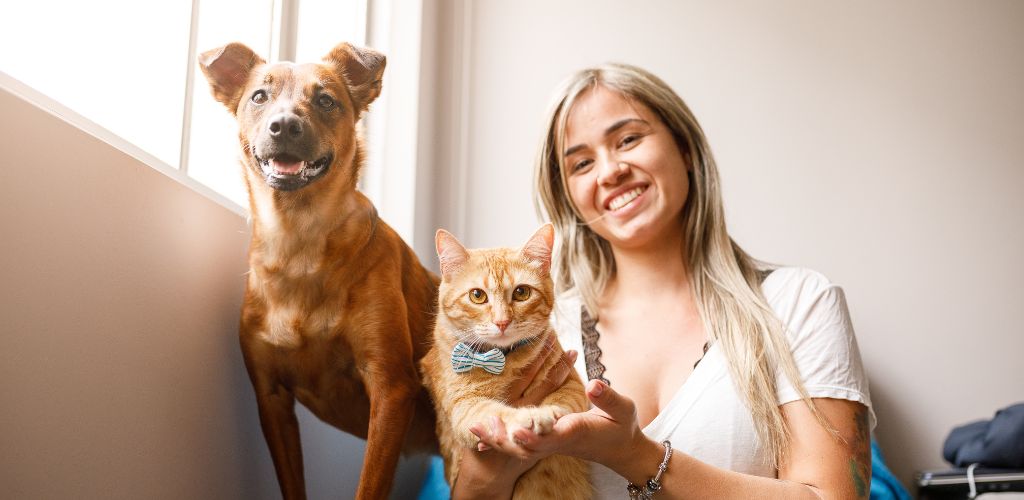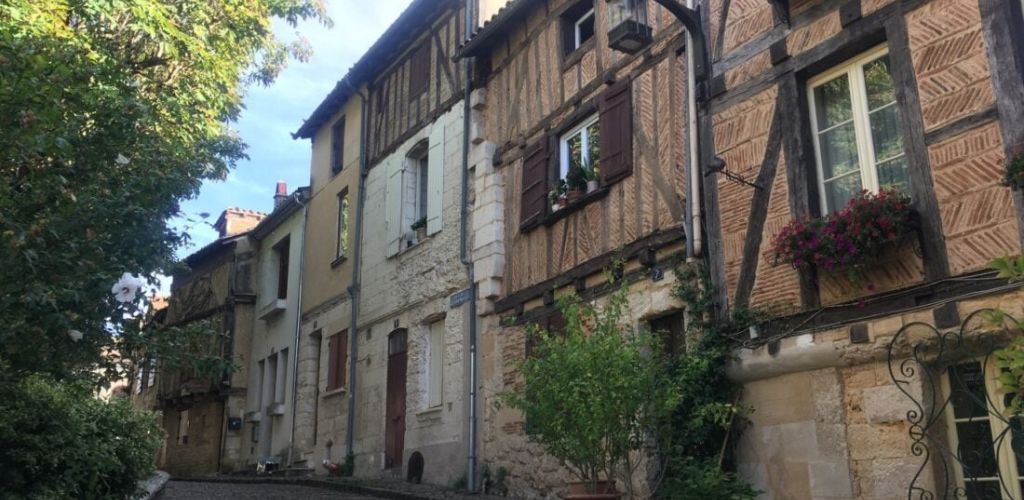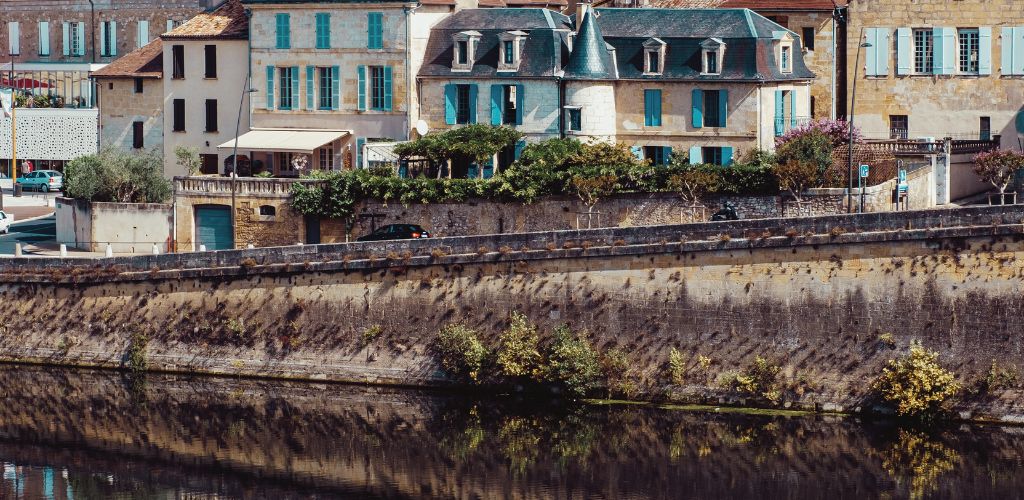In this article, I’ll be outlining the best ways to become a house-sitter in France. Alongside my husband, Rob, I’ve been traveling the world continuously for two years. I regularly use house and pet-sitting sites to enhance our experiences and keep our accommodation costs down.
There are several excellent websites available for house and pet-sitting. Knowing the best ones and how to use them efficiently will help you secure house-sitting jobs in France and the rest of the world. I’ll be outlining all my experiences, good and bad, in this article.
I’ve completed over thirty housesits; ranging from looking after a small ranch in Tucson, Arizona, to caring for beach-loving dogs in Santa Theresa, Costa Rica. I house-sat and pet-sat three different times in France over 2 and a half months. This included looking after 2 adorable dogs, 2 cute cats, and a menagerie of birds, just outside of Toulouse, France.
Since I started house and pet-sitting, I’ve not only received free accommodation worldwide, but I’ve learned a lot and have some good tips to pass on. House sitting is a great way to meet new people and discover different parts of a country that you might not otherwise get to see. Let’s get started.
How to Become a House Sitter in France
There are several great websites available for any burgeoning house and pet sitters. Finding the right one for you is the first important step to take. Different sites have different pros and cons, so read on to find out more.
1. Trusted Housesitters


Trustedhousesitters.com is my go-to site and the one I’ve used more than any other. Their app and website-based platforms are easy to use and there’s always a ton of listings available. I just checked, and currently, there are 6,530 listings accepting applications for housesits around the world…many of which are luxury house sitting gigs.
My favorite aspect of Trusted Housesitters is the ability to save your searches. For example, when I was looking for options in France, I set my dates, my location (country or city/area), and other search criteria. If you don’t get any hits immediately, you can save a search and be alerted when one fits the bill.
Basic yearly membership starts at $95 and allows for unlimited applications and housesits. Higher-tier memberships include different benefits such as insurance, vet chats, premium customer service, and a search and alert function. The top membership is $190 a year. Goats On The Road readers receive 20% off using this link and promo code GOATS20.
2. House Carers


Housecarers.com is an easy-to-use website-only house and pet-sitting site. Although the number of listings can’t compete with Trusted Housesitters, it is a great idea to keep your options open and to build your profile. Most people listing their property only use one website, so the right posting for you could be waiting on another platform.
Housecarers.com doesn’t yet have an app facility, so you have to head to the webpage to keep on top of things. Members receive email notifications and alerts for possible housesits and when communicating with a host. The functionality of the searches is great and can be well-tailored to suit various preferences, locations, dates, pets, etc.
Housecarers.com is an affordable introduction to the world of housesitting. They have a free membership that allows you to peruse all their listings in full. To apply, you’ll need to become a fully-fledged paying member which at around $50/year is a great deal.
If you’re thinking of becoming a house-sitter in France, Housecarers.com might be a good place to start to get a feel of what a housesitting website offers and how it all works.
☞ SEE ALSO: How to Prepare For Your House and Pet Sitting Job
3. Workaway


Workaway.info is perhaps better known as a volunteer/cultural exchange website than it is for housesitting, but it shouldn’t be overlooked. I’ve used it to find placements all over the world where food and accommodation are exchanged for 4-5 hours of work a day. However, it has since become a valuable tool of mine for house and pet sitting.
One of their main search options is house-sitting and at a quick glance, there are over 500 listings seeking sitters around the world, including many people looking for a house-sitter in France. Their website and app are easy to use, listings are always well presented with plenty of details, and communication with hosts is usually pretty efficient.
Membership costs around $50/year or $30pp/year when a couple signs up with a joint membership. I’ve made some terrific connections, long-term friends, and global contacts via Workaway. I highly recommend it as a string to your house-sitting bow. See Also:
4. Mind My House


Mindmyhouse.com is one of the longest-serving online platforms for house-sitting. It began in 2005 and has a terrific open ethos that benefits everyone involved. They’re also one of the cheapest around at just $29/year.
I love Mind My House for the close-knit feel of the company. If you have an issue, you’ll likely speak directly to one of the owners of the company. They play an active role in the day-to-day. The ‘About Our Members’ section of their website is a great feature. It shows how many hosts and sitters are currently active and where they are. Right now, users are at around 12,500 people.
In my opinion, Mind My House might just be the right option to get you started if you’re lacking a little confidence in embarking on your house and pet-sitting career in France.
5. Nomador


Nomador.com is a great site if you’re looking to become a pet sitter or house sitter in France. Although they do have listings around the world, there are a ton in Europe. Their website is very similar to Trusted Housesitters, priced similarly, and equally as easy to use.
A great membership option with Nomador is their 3-month short-term basic package. It allows new users to dip their toes in and see if the housesitting game is for them. Added benefits such as insurance, premium customer service, and early access to new listings come with higher membership prices. The top-end package is around $190/year.
Despite not having an app, Nomador is a great option for newcomers to house and pet sitting. See Also: Questions to Ask a Home and Pet Owner Before Accepting a Job
Personal Experience Housesitting in France


My husband and I pet-sat in France for just over two months. It was amazing! Even in mid-November, it’s warm enough to drink a beer outside in the south of the country. Whether you’re in a small town out in the countryside or one of the big cities, it’s such a beautiful destination with something for everyone.
Given the number of available opportunities to be a pet sitter or house sitter in France, I didn’t struggle to find great sits in some stunning locations. A countryside yoga retreat, complete with a fitness studio and a pool probably tops the list – a real ‘pinch me’ moment.
House-sits in France generally include a pet, or pets, to look after. In rural areas, an element of gardening and watering usually comes into the equation too. Just housesitting listings (no pets) do come up, but for the most part, a pet or pets are typically always part of the bargain. Each time I’ve been a house-sitter in France, the hosts have included a car too (more on this later).
I looked after 2 beautiful mostly outdoor cats in Bergerac, where my biggest task was maintaining the swimming pool! Then I moved further north to Limoges and took care of a friendly little Jack Russel terrier called Alfie. My final stop was just outside Toulouse, in the tiny but lovely village of Cologne – 2 cats, 2 dogs, and let me count… 23 birds!
☞ SEE ALSO: 15 Pros and Cons of House and Pet Sitting
Best Areas to House Sit in France
As I’m originally from the UK, I’ve visited France many times in the past. There are lots of great areas to visit from small towns in the countryside to huge cities. Here are a few of my top places to consider house-sitting in France:
1. Paris


The most iconic, and perhaps the most obvious, place to enjoy house-sitting in France is the French capital, Paris. It’s a truly wonderful city full of art and culture that bubbles with life and atmosphere — there are endless things to see and do in Paris. World-class restaurants, cool bars, and cafes that set the standard for coffee culture worldwide are around every corner.
House-sitting in a big city like Paris will mean more of an urban setting and the experience will be akin to a city break rather than a rural retreat. Smaller city houses and apartments seem to dominate many of the listings I see on the housesitting sites for Paris. This of course comes with the added benefit of having everyday amenities on your doorstep.
I haven’t yet been to Paris for a housesit, but have visited many times for short weekend breaks. It would be an amazing place to base yourself as a house-sitter in France.
Location: Paris is located towards the North of France, around 2.5 hours from the coast and 3 hours from neighboring Belgium. Find it here.
2. Bergerac


My first experience as a house-sitter in France was actually in Bergerac and it’s the perfect place to kick things off. The beautiful and historic town dates back to the Middle Ages and has many well-preserved medieval buildings. It sits on the stunning Dordogne River and is a popular destination for tourists.
A great benefit to house-sitting in Bergerac is that a lot of people speak English. This is due to the amount of British tourists and expats that live in the region. I ordered a round of drinks in my best bad French, and the waitress responded in a thick London accent, “Shall we talk in English instead?”.
There are loads of cute towns situated nearby such as Pereguex and Riberac, and Bordeaux is just over an hour away. Good transport links make getting out and about easy. It’s usually pretty cheap too. I used BlaBlaCar several times, which is a great ride-sharing app exclusive to Europe and very cheap.
Location: Bergerac is located towards the southeast of France, around an hour east of Bordeaux and 6 hours south of Paris. Find it here on the map.
3. Toulouse


I house-sat and pet-sat just outside Toulouse for about a month. My location was quite a small town just outside of the city but it was really easy to get to central Toulouse. Luckily, the hosts left their car behind for use during our stay. There’s an express train into Toulouse that I traveled on a lot, which at certain times of the day costs around $1.
Toulouse is known as ‘The Pink City’. This is due to the number of terracotta brick buildings that give it a warm and rosy glow. The Canal du Midi, a UNESCO World Heritage Site, runs through Toulouse, with many great spots for leisurely strolls, boat rides, or simply relaxing.
Toulouse has a bustling vibe, with lively markets, cafes, and a thriving restaurant and nightlife scene. A trip to the Convent des Jacobins is an amazing experience. Drinks beside the Garonne River and Pont Neuf are also a must. House-sitting in this region would be ideal for anyone seeking quiet retreats on the outskirts, slightly outside of a more fast-paced city experience.
Location: Toulouse is located in the southern part of France, around 105 miles (170 km) from the border of Andorra and 155 miles (250 km) from Spain. Paris is around 420 miles (678 km) to the north.
4. Montpellier


Montpellier was the first city I visited in France and it offers a unique experience for anyone considering becoming a house-sitter in France. One of my favorite things about being a temporary local is not just visiting but truly living somewhere. Imagine waking up in a centuries-old home with narrow medieval streets just outside your doorstep – that’s Montpellier!
A great perk of housesitting in Montpellier is indulging in the many culinary treats. Fresh produce is sold daily at local markets and there are several outstanding restaurants and cafes all over the city. Montpellier is also known for its lively atmosphere due in part to it being home to one of Europe’s oldest universities.
Beyond the city, housesitting in the Montpellier area could even include beach stays along the Mediterranean coast or more rural homes surrounded by the natural beauty of the region. Situating yourself here would give you the freedom to explore the beaches, spend time in nature, and embrace a vibrant city as a house-sitter in France.
Location: Montpellier is located on the Mediterranean coast in the south of France. It’s around 2.5 hours east of Toulouse, 3.5 hours west of Nice, and 280 miles (450 km) to the Italian border. Click here to find Montpellier on the map.
5. Limoges


Limoges was a new city for me. I knew it was a pretty centrally located, big city, with a university, and that it had good direct train links to my next already-confirmed placement in Toulouse.
I’m glad I opted to visit Limoges. It’s a city steeped in history and it exudes an old-world charm, with its cobblestone streets and half-timbered houses. Although my house-sit was a fairly modern apartment, house-sitting opportunities here could be for centuries-old homes. What an experience that would be!
There are some great museums, a magnificent cathedral, and some fascinating historical sites that will delight fellow history buffs like me. As a university town, there are lots of cool bars and great places to eat to suit every budget, and there’s always lots going on. My husband and I spent his birthday in Limoges and it was a great day of food, drink, and cultural sightseeing.
Location: Limoges is located fairly centrally in France, edging towards the south. It is around 4 hours south of Paris and 3 hours north of Toulouse. Find it here on the map.
Is France Safe?


I found France to be a safe place to visit, and it is considered a safe destination for travelers. Like any country, it’s important to remain vigilant, especially in crowded tourist areas where petty theft can occur. Exercise common sense, such as keeping an eye on personal belongings and staying aware of your surroundings.
French authorities take security seriously, and major tourist sites are often well-monitored. As a house-sitter in France, do your best to stay informed about any advisory warnings, and in case of any emergency, dial 112 the European emergency number. Having an insurance policy to cover things such as personal injury, loss of belongings, and theft is always highly advisable.
If it’s your first time as a house-sitter in France and you plan to drive, it’s always a good idea to familiarize yourself with local driving regulations ahead of time. Don’t learn things the hard way, especially if you’re renting a car or using the owners’ vehicle. Even experienced drivers will benefit from a quick read-through of another country’s driving customs.
Pros and Cons of Being a House Sitter in France


There are pros and cons to staying anywhere. Here are a few of the key points that have cropped up during my time as a house-sitter in France:
Pros of Living in France
- Quality of Life: France consistently ranks high for quality of life. It has a strong healthcare system, excellent public services, and a good focus on work-life balance.
- Culinary Paradise: Renowned for its gastronomy, France has a diverse and exquisite culture with food that is deeply ingrained in its culture and history. As a house-sitter in France, you’ll be spoilt for choice!
- Public Transportation: Efficient and extensive public transportation networks make commuting and travel within France convenient and eco-friendly.
- Cultural Richness: France’s rich art, literature, and architecture history is unparalleled.
- Scenic Landscapes: From the picturesque countryside to the stunning Mediterranean coast, France is home to many breathtaking landscapes.
- Incredible Wine: France is well known for making some of the best wine in the world. Good bottles of wine are available in supermarkets for as little as $2.
Cons of Living in France
- Bureaucracy: France is known for bureaucratic processes that can often be complex and time-consuming.
- Language Barrier: The language barrier can be challenging for a house-sitter in France who isn’t fluent in French. Though many French people speak English, many also do not.
- Strikes and Protests: France has a history of strikes and protests, which can occasionally disrupt public services and transportation.
- Cost of Living: The cost of living in certain areas, especially in major cities like Paris, can be relatively high compared to other countries.
- Weather Variability: While France generally has a pleasant climate, weather conditions can vary, and some regions experience extreme temperatures and weather events.
- Seriously Rural Areas: If you like having amenities on your doorstep 24/7, some of France’s more rural areas may not be for you as they lack everyday conveniences. Many small towns and villages require a drive into bigger towns for services.
- Weekend Hunters: Hunting with guns or packs of dogs is a popular pastime in many regions of France especially on weekends. If you’re pet-sitting or planning to become a house-sitter in France take extra precautions and seek advice from your hosts about where to go and when.
Tips for House Sitting in France


With much to consider before taking on a listing, I’ve put together a few of my top tips for house-sitting in France:
- Know your location: France has some very rural areas and housesits may be way out in the countryside unsupported by public transportation. Be fully aware of the exact area you’re heading to and how easy it is to get to grocery stores, cafes, etc.
- Ask about a car: If the people you’re housesitting for are leaving the country they may be leaving their car behind. In most cases, the insurance in France covers anyone with a valid license to drive a properly insured vehicle – perfect for a house-sitter in France!
- Learn the market schedule: Weekly markets are still a very popular thing in France, it’s how a lot of locals get most of their produce. You’ll find everything from clothes and fast food to fresh and affordable groceries at a town market.
- Carry some cash: Most places, even the markets, accept card payments but not all. If you’re staying outside of a big city finding a cashpoint that doesn’t charge a hefty fee can be a real pain. Grab a reasonable cash float when you can.
- Prepare for spotty WiFi: Most hosts will be clear and upfront about the WiFi situation. We’ve had a few connection issues in rural France so I recommend having a pay-as-you-go SIM for data as a backup.
- Plan your shopping: Many supermarkets, even the really big ones will close around noon on Sundays. So plan your shopping accordingly.
- Prepare to make fires: I found that many rural houses in France were heated almost exclusively by a fireplace. Hosts should always leave you ample supplies of wood and show you how to operate them, but building good fires is a necessity out in the French countryside.
House Sitting in France: FAQs
Here are some answers to the most commonly asked questions about house-sitting in France:
It’s not compulsory to have any insurance but it is highly advisable to take out some form of insurance when house-sitting in France. House and pet-sitting websites offer insurance options to cover cancelations by a host. For medical, travel, personal injury, and theft, it would be very wise to take out your own policy.
If you would like to become a pet or house-sitter in France, the first step would be to sign up for a pet-sitting website. There are many great ones available such as Trusted Housesitters, Mind My House, and Nomador. Most sites allow you to either join for free, enabling you to have a good look around, or pay a small premium to see if it’s the right one for you.
I personally love Trusted Housesitters, it’s been my go-to site for years now and I use it almost exclusively. Once you’ve signed up, build a full and glowing profile and start planning how to rack up the 5-star reviews.
No, being a house-sitter in France won’t generate a direct income stream. Generally, the house and pet-sitting sites that are available do not include any kind of payment. Payment is in the form of a usually wonderful house, in an amazing part of the world. It may be possible to get paid to be a house-sitter in France, but I haven’t come across this option yet.
Yes, there are listings for house-sitting in France without pets, they are quite rare but they certainly do come up from time to time. However, the majority of placements in France do involve pets.
House sitting in France long term is certainly possible but it depends entirely on where you’re from and what length of visa you are allowed. Be sure to check and abide by these regulations thoroughly. Long-term sits in France regularly appear on various house-sitting websites.
House-sitting in France is a wonderful experience. With a mixture of stunning countryside and some breathtaking and vibrant cities, France offers a bit of everything for anyone planning a placement there. Easy and affordable public transportation makes it easy to get around from city to city. The people are friendly, warm, and welcoming.
A car is not always included with a house-sit in France, or anywhere else in the world for that matter. However, it is included with many house and pet-sits. Hosts are generally upfront about the use of their vehicles, which is handy. If it doesn’t mention anything about a car in the listing, it never hurts to ask.
A car is a necessity for many placements and having one could be the difference between applying and not. For the most part, car insurance in France covers the car for anyone to drive it with a valid license, so the possibility of being loaned one is greatly increased.
You should write an honest, personalized, and friendly application when applying for a house or pet-sit in France. Read the listing thoroughly and refer to points the host has specifically mentioned i.e. ‘Rex loves 3 long walks a day’. Referencing the (correct!) pet names is a good idea too.
Be open to a video chat, further correspondence, and any questions they may have. Be clear on your travel plans too. For example don’t say “I guess I could be there around 1st May”, be more assertive – “I land in Paris on 1st May, your dates work perfectly for me’.
Though it is rare, house and pet-sits can be changed or canceled at the last minute. This can be a problem if your travel plans have already been organized. However, many housesitting websites offer membership options that cover this. I would recommend opting for membership tiers or options that cover you for this if you’re planning to house-sit long-term.
In Conclusion
I hope this article has helped with some ideas on how to become a housesitter in France. It really is a wonderful country and one that I feel everyone should experience at some point in their lives.
House and pet sitting provides an amazing opportunity to travel more cost-effectively. For me, it also heightens the experience of every trip. I’ve made some lifelong friends along the way, with both the people I have sat for and their friends and neighbors.
I rave about house and pet-sitting to anyone who will listen. It’s something that’s changed my life and has opened up so many windows of opportunity for travel that I never thought possible.
Good luck!

